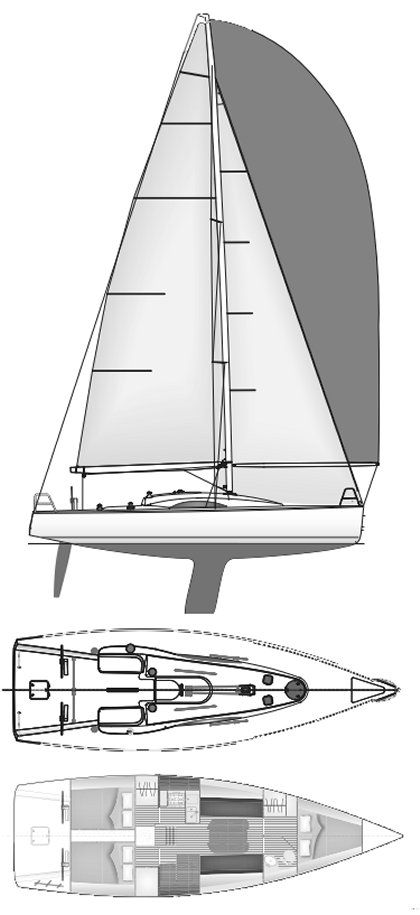The Archambault 40 RC (Racer/Cruiser) is a testament to the French shipyard's dedication to building yachts that blend competitive sailing prowess with comfortable, functional interiors. Conceived by the renowned Joubert Nivelt Design, and launched by Archambault Boats around 2005, this monohull quickly established itself as a formidable contender on the race course while offering sufficient amenities for enjoyable cruising. It embodies the essence of a modern performance cruiser, designed for sailors who refuse to compromise on either speed or liveability.
Archambault 40 RC Information, Review, Specs

- Make
- Archambault
- Model
- 40 RC
- Number Built
- Production Year(s)
- 2005 - ??
History and Design
The Archambault 40 RC emerged from a lineage of performance-oriented yachts built by Archambault Boats, a company founded in 1959 with a clear vision to craft vessels that excelled in competition. Designed by the highly respected Joubert Nivelt Design, the 40 RC's creation around 2005 aligned with Archambault's reputation for producing light, stiff, and fast fiberglass hulls. The design brief for the Archambault 40 RC was explicitly to create a racer that could also cruise comfortably, evident in both its cockpit and interior layout. The model was specifically optimized for the International Rating Certificate (IRC) rule, a focus that ensured its competitive edge in diverse racing environments. While the lists a production start year of 2005, other sources indicate production began as early as 2003 and continued even after Archambault's financial difficulties, with some designs built by BG Race until 2017. Notably, some early examples were even prototypes built by Marsaudon before serial production at Archambault.
The "RC" designation itself highlights the boat's dual purpose, with some referring to it as a "turbo-charged" version of the standard A40, aiming for enhanced performance. The collaboration with Joubert Nivelt ensured that the 40 RC featured sleek lines, efficient foils, and responsive handling, characteristic of Archambault's most successful models.
Sailing Performance and Handling
The Archambault 40 RC's design metrics clearly indicate its performance orientation. With a calculated Sail Area to Displacement ratio of approximately 22.65, the boat exhibits a strong capacity for performance, particularly in lighter air, suggesting it is easily driven and responsive. The Ballast to Displacement ratio, at around 0.466, is quite high, signaling a stiff and stable yacht capable of standing up to significant wind pressures without excessive heeling. This contributes to both its racing efficiency and crew comfort in a seaway. Furthermore, a Displacement to Length ratio of approximately 158.4 places the 40 RC firmly in the lighter, more performance-oriented category for a vessel of its size, underscoring its design as a fast and agile platform.
Anecdotal reports and reviews consistently praise the Archambault 40 RC for its lively and responsive handling. It is known to shine under sail, delivering "turbo power both upwind and down." The deck layout is notably centered around a spacious, open-transom cockpit, which is ideal for efficient sail handling and crew movement during racing, yet equally functional for relaxed cruising. The boat is generally regarded as well-built and rich in top-notch equipment, making it suitable for both coastal sailing and demanding offshore racing.
Accommodations and Layout
While primarily designed as a racer-cruiser, the Archambault 40 RC offers accommodations that aim to provide comfort for its crew, with some descriptions noting "cozy accommodations to make racers want to stay cruise a little bit longer." The interior is typically equipped with eight berths, suggesting a layout that includes a forward V-berth, two aft cabins, and settees in the salon convertible to berths.
Interior joinery work is often executed in Moabi mahogany, complemented by white vinyl-lined ceilings and dark grey microfibre upholstery, creating a classic yet practical aesthetic. This combination of materials speaks to a balance of durability and a level of finish suitable for a boat of its caliber. The overall interior design reinforces the initial brief: a sailboat that is clearly a racer but also allows for comfortable cruising, providing a welcoming space after a day on the water.
Owner's Perspectives
Owners of the Archambault 40 RC frequently commend its solid construction and excellent sailing characteristics. The yacht is often seen as a well-priced, mid-tech raceboat that delivers on its promises, reflecting Archambault's efforts to ensure it performs as intended. While specific common issues are not widely detailed in public forums, some owners have opted to enhance their vessels with additions such as furlers and autopilots, indicating a commitment to further optimizing the boat for ease of use and long-distance comfort. The enduring appeal of the Archambault 40 RC on the used yacht market, years after the builder ceased operations, is a testament to its lasting quality and performance reputation, fostering an active community of owners who appreciate its strong sailing pedigree.
Measurements
Construction & Hull
- Construction Material
- Fiberglass (Solid)
- Hull Type
- Monohull Sailboat
- Keel Type
- Fin
- Rudder
- 1x Spade
- Ballast
- 6834 lbs
- Displacement
- 14661 lbs
- Water Capacity
- 26 gal
- Fuel Capacity
- 20 gal
Engine
- Engine Make
- Nanni
- Engine Model
- —
- Engine Type
- —
- Engine HP
- —
- Engine Count
- 1
- Drive Type
- —
- Fuel Type
- Diesel
Rig & Sails
- Rig Type
- Fractional Sloop
- P (Main Luff)
- 51.77 ft
- E (Main Foot)
- 17.55 ft
- I (Foretriangle Height)
- 50.88 ft
- J (Foretriangle Base)
- 15.42 ft
- Forestay Length (est)
- 53.17 ft
- Main Sail Area
- 454.28 sqft
- Foretriangle Sail Area
- 392.28 sqft
- Total Sail Area (Reported)
- 847 sqft
- Total Sail Area (Calc)
- 846.57 sqft
Dimensions
- LOA
- 39.3 ft
- LWL
- 34.58 ft
- Beam
- 12.3 ft
- Draft
- 8.14 ft
- Max Headroom
- -
- Air Draft
- -
Calculations
- Hull Speed
- 7.88 kn
- Pounds per Inch Immersion
- 1